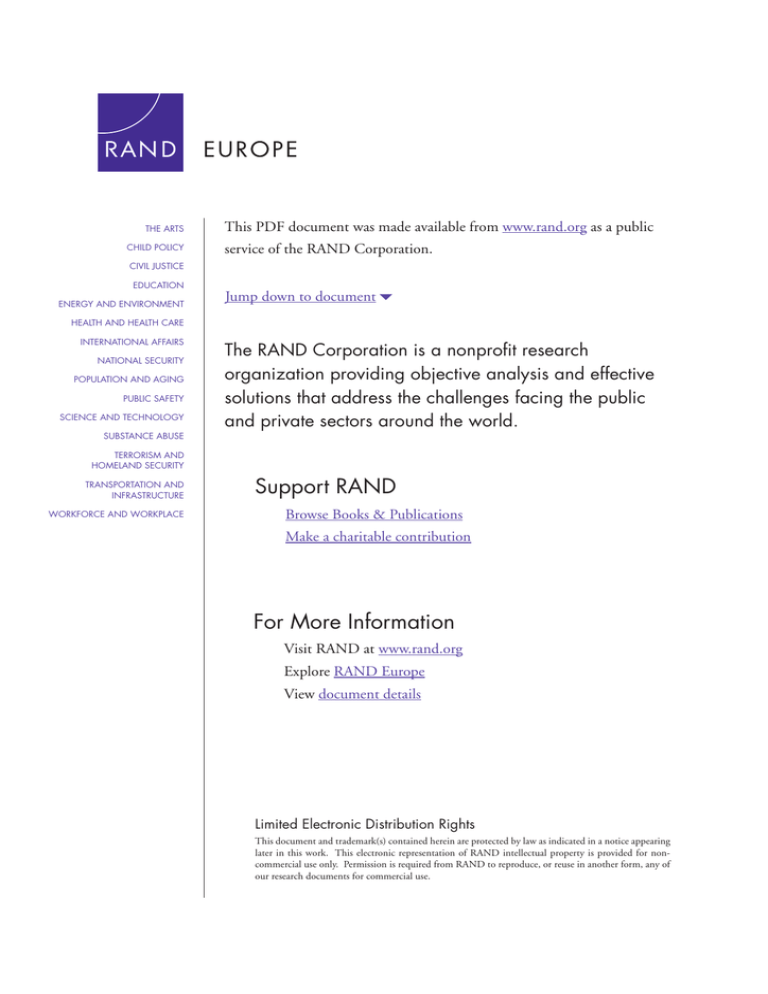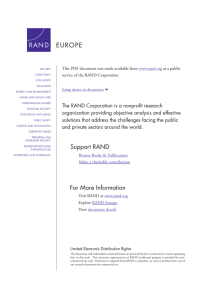
THE ARTS
CHILD POLICY
This PDF document was made available from www.rand.org as a public
service of the RAND Corporation.
CIVIL JUSTICE
EDUCATION
ENERGY AND ENVIRONMENT
Jump down to document6
HEALTH AND HEALTH CARE
INTERNATIONAL AFFAIRS
NATIONAL SECURITY
POPULATION AND AGING
PUBLIC SAFETY
SCIENCE AND TECHNOLOGY
SUBSTANCE ABUSE
The RAND Corporation is a nonprofit research
organization providing objective analysis and effective
solutions that address the challenges facing the public
and private sectors around the world.
TERRORISM AND
HOMELAND SECURITY
TRANSPORTATION AND
INFRASTRUCTURE
WORKFORCE AND WORKPLACE
Support RAND
Browse Books & Publications
Make a charitable contribution
For More Information
Visit RAND at www.rand.org
Explore RAND Europe
View document details
Limited Electronic Distribution Rights
This document and trademark(s) contained herein are protected by law as indicated in a notice appearing
later in this work. This electronic representation of RAND intellectual property is provided for noncommercial use only. Permission is required from RAND to reproduce, or reuse in another form, any of
our research documents for commercial use.
This product is part of the RAND Corporation technical report series. Reports may
include research findings on a specific topic that is limited in scope; present discussions of the methodology employed in research; provide literature reviews, survey
instruments, modeling exercises, guidelines for practitioners and research professionals, and supporting documentation; or deliver preliminary findings. All RAND
reports undergo rigorous peer review to ensure that they meet high standards for research quality and objectivity.
Policy and practice impacts
of research funded by
the Economic and Social
Research Council
A case study of the Future of Work
programme, supporting data
Edward Nason, Lisa Klautzer, Jennifer Rubin,
Stephen Hanney, Steven Wooding, Jonathan Grant
Prepared for the Economic and Social Research Council
The research described in this report was prepared for the Economic and Social Research
Council.
The RAND Corporation is a nonprofit research organization providing objective analysis
and effective solutions that address the challenges facing the public and private sectors
around the world. RAND’s publications do not necessarily reflect the opinions of its
research clients and sponsors.
R® is a registered trademark.
© Copyright 2007 the Economic and Social Research Council
All rights reserved. No part of this book may be reproduced in any form by any electronic or
mechanical means (including photocopying, recording, or information storage and retrieval)
without permission in writing from the copyright holder.
Published 2007 by the RAND Corporation
1776 Main Street, P.O. Box 2138, Santa Monica, CA 90407-2138
1200 South Hayes Street, Arlington, VA 22202-5050
4570 Fifth Avenue, Suite 600, Pittsburgh, PA 15213-2665
Westbrook Centre, Milton Road, Cambridge CB4 1YG, United Kingdom
RAND URL: http://www.rand.org/
RAND Europe URL: http://www.rand.org/randeurope
To order RAND documents or to obtain additional information, contact
Distribution Services: Telephone: (310) 451-7002;
Fax: (310) 451-6915; Email: order@rand.org
Executive summary
We examined how the ESRC Future of Work (FoW) programme influenced policy and
professional practice. While doing so we reflected on the methods used to assess and
identify impacts. Specifically, we considered whether the Payback Framework, a conceptual
model for research evaluation, was appropriate for social science. Here we summarise the
key findings.
The FoW brought together an interdisciplinary group of academics,
stimulated constructive discussion and provided access to policy makers.
This may be especially significant given the view expressed by key informants that
employment policy and management practices may be especially hard to reach with
evidence as they are heavily contextual and apt to be influenced by fashion and ideology.
Impacts
The FoW programme had significant impacts on knowledge and research. This was
evident in the numerous publications and conference presentations attributed to the
programme. Most Principal Investigators (PIs) attributed incremental changes in their
field of research to their projects, and some attributed a clear change of direction in their
field of research to their projects. Most of the projects also influenced other researchers.
The FoW programme had significant impacts on public policy. Although some PIs
could identify specific impacts of their research, many found it difficult to identify actual
policies they had influenced. PIs generally thought they had influenced policy in an
incremental way and informed the policy debate. PIs also gave many presentations of
FoW research to policy audiences.
The FoW programme had significant impacts on career development. More than
75%of PIs thought the FoW programme had helped them to form networks with
researchers, policy makers and practitioners; nearly half of PIs attributed career
development for researchers to their FoW projects, including nine secondments to
government.
The FoW programme impacted on the policies and practice of organisations. There
were many presentations given in organisations; PIs thought organisational practices were
influenced by the research, but only some were easily identifiable.
xi
Policy and practice impacts of ESRC funded research
RAND Europe
The policy environment determines policy impact. In one case the heightened awareness
among policy makers of issues around maternity leave and women returning to work
provided fertile ground for research on how women make these decisions. In a second case
the waning interest in union-employer partnerships was thought to have reduced the
impact of a TUC institute chaired by a former FoW researcher. In general, the FoW
research seldom caused major changes in policy but often resulted in impacts such as
stimulating debate, fine-tuning policy, dispelling myths and providing confirmatory
support.
Dissemination
The FoW programme provided access to policy makers. It effectively combined the
networks of the Director and steering committee, and provided the researchers access to
these networks which included key policy makers in the DTI, Low Pay Commission
(LPC) and Cabinet Office.
The FoW Media Fellow enhanced the impact on policy makers. This was achieved
largely for two reasons. First, because his summaries of the FoW research were produced
to a timescale suitable for policy makers, rather than researchers. And second because they
were accessible to policy makers: setting the FoW research in the context of other research
and current policy discussions.
Researchers and policy makers differed in their views on how best to disseminate to
policy makers. The two groups consider different channels to be important: researchers
favouring academic publications, policy makers favouring the Media Fellow’s
publications.
The Payback Framework is a useful model for evaluating social science
research.
The Payback Framework provides a structure for research evaluation. It comprises a logic
model of the research and dissemination process and a classification scheme for the
immediate and wider impacts of research. This consists of five categories: Knowledge;
Impacts on future research; Impacts on policy; Impacts on practice and Wider social and
economic impacts. Both the literature review and fieldwork showed that the Framework
could be effectively applied to social science research.
Impacts and attribution
Some impacts may be inaccessible to evaluation, for example some impacts were
politically sensitive, so participants requested that they were not discussed. Also, subjects
of the original research may have been influenced by their participation in that research,
but their identity could not be revealed to the researchers in this evaluation.
A confluence of inputs and incremental ‘knowledge creep’ make it difficult to
attribute policy change to a given input. The Payback Framework provides a structure
in which to explore the context within which projects are developed. However, the
incremental nature of policy remains a difficulty in assessing impact at the project level.
xii
RAND Europe
Executive Summary
There are few mechanisms in social science to codify and synthesise research. In
contrast to biomedical science, in the fields covered by the FoW programme there are
fewer formal mechanisms to systematically review research; these mechanisms can offer
tracers of policy influence.
Timing
Research on impacts may happen too early or too late. If research on impacts occurs too
early, some impacts may not yet have occurred. If it occurs too late, certain impacts may
have already come and gone. This possibility of transience makes it harder to investigate
the impacts, as they may not be captured by a current snapshot of policies and policy
debates. In order to provide a comprehensive view of the wider impacts of research it this
project suggests it would be important to warn researchers at the start of the project about
likely evaluations; provide researchers with a mechanism to capture early impacts; and
then evaluate research after further impacts have had time to develop, probably 5-10 years
after completion of the research. The literature suggests that for research relating to ‘hot
topics’ in policy, initial impact is likely to occur earlier and that 2 years post completion
may provide the best time frame for evaluation.
Implementation of evaluation
There was widespread cooperation in the evaluation. The majority of PIs (including all
case study PIs), 80% of nominated research users, and others nominated by PIs, agreed
to participate in the research when approached.
Researchers and users may prefer structured interviews to written surveys. Our
experience also suggests that such interviews would provide more useful information for
evaluation. Our on-line survey required significantly more of most participants’ time than
predicted.
xiii








